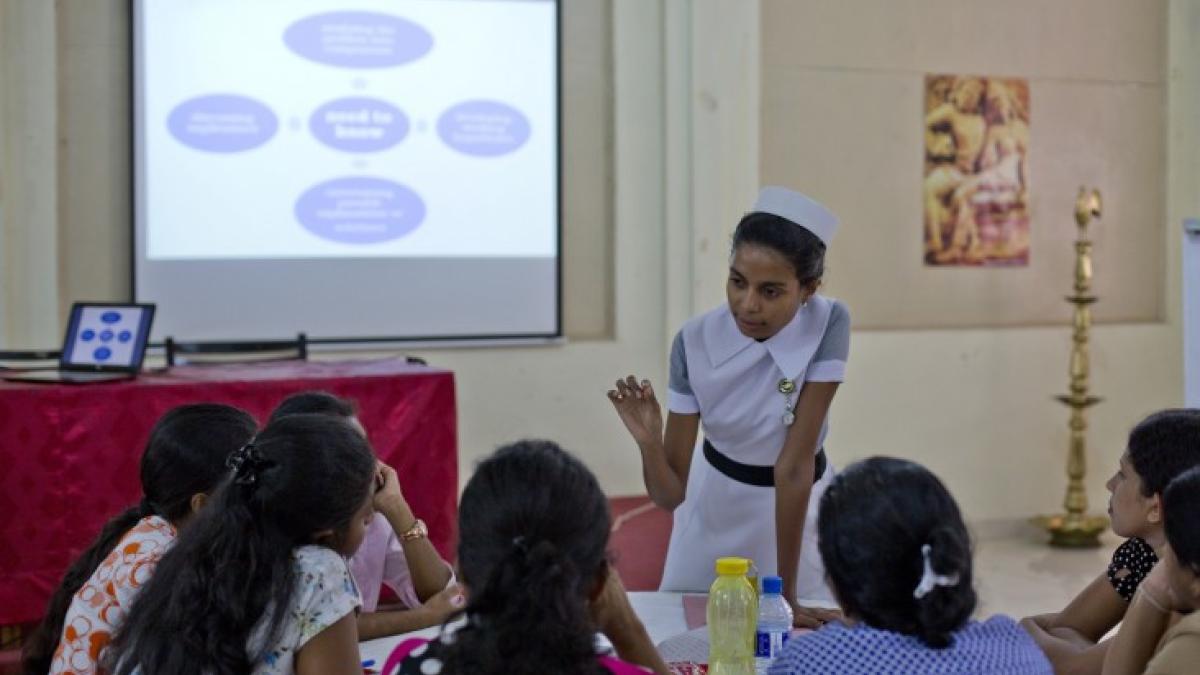
Gemunu Amarasinghe
USAID programs employ evidence-based mental health and psychosocial support interventions that are delivered by local providers trained and certified to meet established standards of care, thereby ensuring a strong network of care and improved mental health outcomes for recipients.
Victims of Torture and Trauma

patient as part of a USAID-funded partnership between
the National University of Kyiv Mohyla Academy in
Ukraine and Johns Hopkins University’s Enhancing
Torture Survivor Mental Health Services program.
Vita Kachay
Torture is the intentional infliction of severe mental or physical pain or suffering by or with the consent of state authorities. The 1998 Torture Victims Relief Act (TVRA) of 1998 authorized USAID to work through the Victims of Torture (VOT) program to provide assistance to individuals and families who have experienced physical and psychological effects of torture and trauma. Since 1999, the VOT program has assisted in the treatment and rehabilitation of those who experience the physical and psychological effects of torture through direct service provision to survivors, their families, and communities.
Four interconnected strategic pillars help guide the VOT program:
Provision of Quality, Accessible Services: It is often difficult for survivors of torture to locate services that effectively address their psychological and social needs. VOT programming increases access to MHPSS services that are culturally appropriate and rooted in empirical evidence.
Workforce Development: The gap between MHPSS needs and service availability is significant in USAID countries. MHPSS service delivery will not be sustainable without adequate training and development of an MHPSS workforce. VOT programming supports the development of a global competency-based training and evaluation tool for service providers (including minimally trained providers), as well as the development of university curricula to train professionals.
Systems Strengthening: The long-term sustainability of MHPSS services requires the integration of these services into country-led systems, where appropriate. Often, torture survivors’ first point of access is not through specialized community-based treatment organizations, but through health, education, and social service sectors that often lack the ability to provide (or even recognize) the type of care survivors need. By ensuring these systems are able to identify and provide the necessary MHPSS care—long after donor support ends—USAID recognizes the importance of investing in whole systems.
Research on Effective MHPSS: USAID supports research on specialized MHPSS interventions that address the unique mental health needs of survivors of torture. The Agency also leads efforts to determine the type of interventions most effective in improving the functioning and well-being of survivors.
Using the Inter-Agency Standing Committee Guidelines on MHPSS in Emergency Settings (IASC) as a frame, USAID shares its learning and collaborates with other technical sectors to improve multi-sectoral responses that support people’s mental health and psychosocial well-being in the midst of and in the aftermath of conflict.
To date, USAID:
- Supporting MHPSS activities in all humanitarian responses to address the critical mental health and psychosocial needs of persons exposed to stressors during conflict or crisis.
- Supporting WHO and UNICEF in the development of a global tool for organizations to train and maintain quality of MHPSS service providers in all countries.
- Developed the first mental health treatment protocol designed to be delivered by community workers to treat multiple disorders at the community level in low- and middle-income countries. This protocol has been shown to be effective for depression, anxiety, trauma, substance use, and interpersonal violence in adults, and has also been adapted for use with children, enabling a single provider to treat multiple problems across the lifespan.
- Adapted a mental health treatment protocol specific to trauma for use in low- and middle-income countries, and currently used in the Democratic Republic of Congo.
- Strengthening rehabilitation programs in torture treatment centers around the world by developing their capacity to provide high-quality mental health services to those in need and establishing or improving their governance and management practices.
